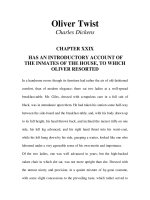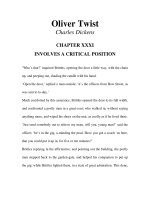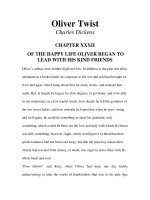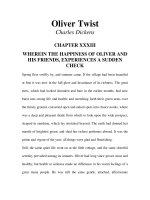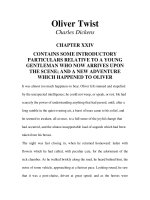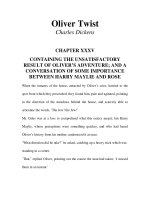Tài liệu LUYỆN ĐỌC TIẾNG ANH QUA TÁC PHẨM VĂN HỌC-Emma -Jane Austen Volume II Chapter XI ppt
Bạn đang xem bản rút gọn của tài liệu. Xem và tải ngay bản đầy đủ của tài liệu tại đây (631.16 KB, 14 trang )
Emma
Jane Austen
Volume II
Chapter XI
It may be possible to do without dancing entirely. Instances have been
known of young people passing many, many months successively, without
being at any ball of any description, and no material injury accrue either to
body or mind;—but when a beginning is made— when the felicities of rapid
motion have once been, though slightly, felt—it must be a very heavy set
that does not ask for more.
Frank Churchill had danced once at Highbury, and longed to dance again;
and the last half-hour of an evening which Mr. Woodhouse was persuaded to
spend with his daughter at Randalls, was passed by the two young people in
schemes on the subject. Frank’s was the first idea; and his the greatest zeal
in pursuing it; for the lady was the best judge of the difficulties, and the most
solicitous for accommodation and appearance. But still she had inclination
enough for shewing people again how delightfully Mr. Frank Churchill and
Miss Woodhouse danced—for doing that in which she need not blush to
compare herself with Jane Fairfax—and even for simple dancing itself,
without any of the wicked aids of vanity— to assist him first in pacing out
the room they were in to see what it could be made to hold—and then in
taking the dimensions of the other parlour, in the hope of discovering, in
spite of all that Mr. Weston could say of their exactly equal size, that it was
a little the largest.
His first proposition and request, that the dance begun at Mr. Cole’s should
be finished there—that the same party should be collected, and the same
musician engaged, met with the readiest acquiescence. Mr. Weston entered
into the idea with thorough enjoyment, and Mrs. Weston most willingly
undertook to play as long as they could wish to dance; and the interesting
employment had followed, of reckoning up exactly who there would be, and
portioning out the indispensable division of space to every couple.
‘You and Miss Smith, and Miss Fairfax, will be three, and the two Miss
Coxes five,’ had been repeated many times over. ‘And there will be the two
Gilberts, young Cox, my father, and myself, besides Mr. Knightley. Yes,
that will be quite enough for pleasure. You and Miss Smith, and Miss
Fairfax, will be three, and the two Miss Coxes five; and for five couple there
will be plenty of room.’
But soon it came to be on one side,
‘But will there be good room for five couple?—I really do not think there
will.’
On another,
‘And after all, five couple are not enough to make it worth while to stand up.
Five couple are nothing, when one thinks seriously about it. It will not do to
invite five couple. It can be allowable only as the thought of the moment.’
Somebody said that Miss Gilbert was expected at her brother’s, and must be
invited with the rest. Somebody else believed Mrs. Gilbert would have
danced the other evening, if she had been asked. A word was put in for a
second young Cox; and at last, Mr. Weston naming one family of cousins
who must be included, and another of very old acquaintance who could not
be left out, it became a certainty that the five couple would be at least ten,
and a very interesting speculation in what possible manner they could be
disposed of.
The doors of the two rooms were just opposite each other. ‘Might not they
use both rooms, and dance across the passage?’ It seemed the best scheme;
and yet it was not so good but that many of them wanted a better. Emma said
it would be awkward; Mrs. Weston was in distress about the supper; and Mr.
Woodhouse opposed it earnestly, on the score of health. It made him so very
unhappy, indeed, that it could not be persevered in.
‘Oh! no,’ said he; ‘it would be the extreme of imprudence. I could not bear it
for Emma!—Emma is not strong. She would catch a dreadful cold. So would
poor little Harriet. So you would all. Mrs. Weston, you would be quite laid
up; do not let them talk of such a wild thing. Pray do not let them talk of it.
That young man (speaking lower) is very thoughtless. Do not tell his father,
but that young man is not quite the thing. He has been opening the doors
very often this evening, and keeping them open very inconsiderately. He
does not think of the draught. I do not mean to set you against him, but
indeed he is not quite the thing!’
Mrs. Weston was sorry for such a charge. She knew the importance of it, and
said every thing in her power to do it away. Every door was now closed, the
passage plan given up, and the first scheme of dancing only in the room they
were in resorted to again; and with such good-will on Frank Churchill’s part,
that the space which a quarter of an hour before had been deemed barely
sufficient for five couple, was now endeavoured to be made out quite
enough for ten.
‘We were too magnificent,’ said he. ‘We allowed unnecessary room. Ten
couple may stand here very well.’
Emma demurred. ‘It would be a crowd—a sad crowd; and what could be
worse than dancing without space to turn in?’
‘Very true,’ he gravely replied; ‘it was very bad.’ But still he went on
measuring, and still he ended with,
‘I think there will be very tolerable room for ten couple.’
‘No, no,’ said she, ‘you are quite unreasonable. It would be dreadful to be
standing so close! Nothing can be farther from pleasure than to be dancing in
a crowd—and a crowd in a little room!’
‘There is no denying it,’ he replied. ‘I agree with you exactly. A crowd in a
little room—Miss Woodhouse, you have the art of giving pictures in a few
words. Exquisite, quite exquisite!—Still, however, having proceeded so far,
one is unwilling to give the matter up. It would be a disappointment to my
father—and altogether—I do not know that—I am rather of opinion that ten
couple might stand here very well.’
Emma perceived that the nature of his gallantry was a little self-willed, and
that he would rather oppose than lose the pleasure of dancing with her; but
she took the compliment, and forgave the rest. Had she intended ever to
marry him, it might have been worth while to pause and consider, and try to
understand the value of his preference, and the character of his temper; but
for all the purposes of their acquaintance, he was quite amiable enough.



